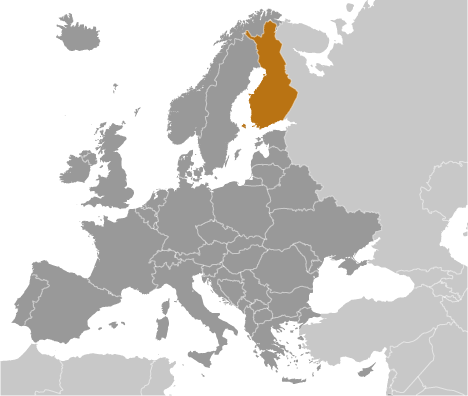HISTORICAL BACKGROUND
Section 12 of the 2000
Constitution states:
(1) Everyone has freedom of expression. Freedom of expression entails the right to express, disseminate and receive information, opinions and other communications without prior prevention by anyone. More detailed provisions on the exercise of the freedom of expression are laid down by an Act. Provisions on restrictions relating to pictorial programs that are necessary for the protection of children may be laid down by an Act. (2) Documents and recordings in the possession of the authorities are public, unless their publication has for compelling reasons been specifically restricted by an Act. Everyone has the right of access to public documents and recordings.(1)
Finland has a long tradition of open access to government files. As a Swedish-governed territory, the 1766 Access to Public Records Act applied to Finland. It was actually introduced by a Finnish clergyman and Member of Parliament named Anders Chydenius.
(2) This remained in effect until 1809 when Finland came under Russian control. After that, openness policy continued through a series of laws and decree on openness and publicity that were periodically adopted and overruled.
(3) When Finland became an independent country in 1917, the new Constitution provided for freedom of expression but did not include specific right of access to documents and the 1919 Freedom of the Press Law created a general presumption of openness.
(4) This was found to be lacking and in 1939, the first President of Finland, K.J. Ståhlberg began work on a new law. He co-drafted a proposal in 1945 which was adopted in 1951 as the Act on Publicity of Official Documents.
(5) It remained in effect until 1999.
The
Act on the Openness of Government Activities replaced the 1951 act and went into effect on 1 December 1999.
(6) It sets the principle that documents are to be in the public domain unless there is a specific reason for withholding. Every person has a right to access any "official document" in the public domain held by public authorities and private bodies that exercise public authority, including electronic records.
Those asking for information are not required to provide reasons for their request or to verify their identity unless they are requesting personal or other secret information. Responses to requests must be made within 14 days. Petitioners, appellants and others persons who are party to a matter have a extended right of access to documents not in the public domain.
Access to "non-official documents" and documents not in the official domain such as private notes and internal discussions are limited and may not be archived. Documents which contain information on decision-making must be kept. Preparatory documents are to be entered into the public domain at the time of decisions, if not earlier.
(7)
The new law codified 120 preexisting secrecy provisions into 32 categories of secret documents that are exempt from release with different harm tests depending on the type of information. These include documents relating to foreign affairs, criminal investigations, the police (including tactical and technical plans), the security police, military intelligence and armed forces "unless it is obvious that access will not compromise" those interests, business secrets, and personal information including lifestyle and political convictions except for those in political or elected office. Documents are kept secret for 25 years unless otherwise provided by law except for personal information which is closed for fifty years after the death of the individual. If the release would "obviously […] cause significant harm to the interests protected", the Government can extend the classification another thirty years.
Government authorities are also required to publish information about their activities and government meetings are open to the public. Indices of documents must be maintained. The authorities must plan their document and computer systems to ensure easy access to information. Government departments have their own websites and have been actively promoting e-government policies.
Appeals to any denial can be made to a higher authority and then to an Administrative Court. The Chancellor of Justice and the Parliamentary Ombudsman can also review the decision. The Ombudsman handles approximately fifty complaints annually. Between 1999 and 2002, the Supreme Administrative Court heard 40 cases under the Act. A review by the Ministry of Justice found that the number of cases had increased following the adoption of the new law but no major problems were found.
(8)
There are also sanctions for those who breach secrecy provisions. Finnish Prime Minister Anneli Jäätteenmäki was prosecuted in 2003 under the Act and the Criminal Code for illegally obtaining and releasing documents during the election campaign relating to meetings between her predecessor and US President George Bush about Iraq. She was forced to step down but was found not guilty in March 2004. An aide to the president was found guilty and fined 80 days salary.
A review by the Ministry of Justice in 2003 found that the act had further solidified openness, especially in the preparatory stage.
(9) It also found half of the authorities had begun to implement good information management practices. 77 percent said that the revisions of the secrecy provisions had been successful but there were still some problems over evaluation of the provisions relating to protection of trade and professional secrets. The Council of Europe GRECO committee noted in 2004 that the policy of openness and electronic access is a key reason for low corruption in Finland:
The long established system of free access to information in Finland is probably a key factor to explain why corruptive practices seem to be exceptional events in the country. The provisions concerning transparency (mainly the Constitution and the Act on Openness of Government activities) apply to all levels of administration and do not only provide for rights to access to all public documents as a main rule, but obliges the authorities to proactively supply information to the public. The GET did not see any sign that the frequent use of electronic means in public administration in any way limited the transparency, but rather the contrary. Finland should be commended for its transparent e-governance policy. (10)
Finland signed the Aarhus Convention in June 1998 and ratified it in September 2004. Access to environmental information is through the Openness Act. The Environmental Protection Act requires that monitoring data on the environment be made public.
(11)
The
Personal Data Act allows individuals to access and correct their records held by public and private bodies.
(12) It is overseen and enforced by the
Data Protection Ombudsman.
(13) Every November, the tax records of every person become publicly available and are widely available and published in newspapers.
The
Archives Act sets rules requiring the retention of important documents.
(14)
2004 freedominfo.org Global Survey Results - Finland
NOTES
1. Constitution of Finland, 2000.
http://www.uni-wuerzburg.de/law/fi00000_.html
2. See Stephen Lamble, "Freedom of Information, A Finnish clergyman's gift to democracy", Freedom of Information Review, No. 97, February 2002.
3. For an detailed history of Finnish FOI, see Stanley Anderson, Public Access to Government Files in Sweden, Am. Jnl of Comparative Law Vol 21 (3). Summer 1973.
4. Painovapauslaki 04/01/1919. http://www.finlex.fi/fi/laki/alkup/1919/19190001001 (In Finnish)
5. Act 83/9/2/1951.
6. Act on the Openness of Government Activities, No. 621/99,
http://www.finlex.fi/en/laki/kaannokset/1999/en19990621.pdf; Decree on the Openness of Government Activities and on Good Practice in Information Management (1030/1999).
http://www.finlex.fi/pdf/saadkaan/E9991030.PDF
7. See
http://www.hare.vn.fi (register of projects and legal preparatory documents).
8. National Research Institute of Legal Policy, Act on Openness of Government Activities: Presentation and analysis of legal practices pertaining to the Act, 2003.
9. Act on the Openness of Government Activities: An Evaluation of its Application by State Administrative Authorities, 2003.
10. GRECO, Second Evaluation Round - Evaluation Report on Finland, Greco Eval II Rep (2003) 3E, 2 July 2004.
11. Environmental Protection Act. No. 86/2000.
12. Personal Data Act (523/1999).
http://www.tietosuoja.fi/uploads/hopxtvf.HTM
13. Homepage:
http://www.tietosuoja.fi/1560.htm
14. Archives Act (831/1994).
http://www.narc.fi/law/lawfr.html





















